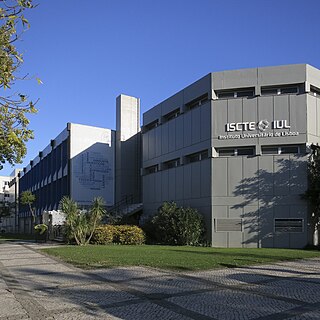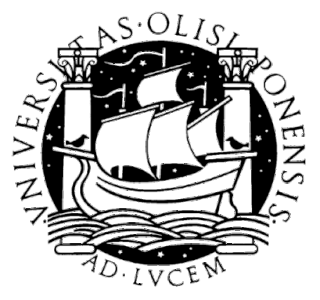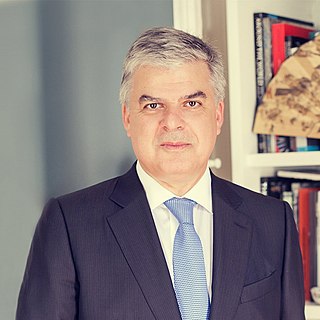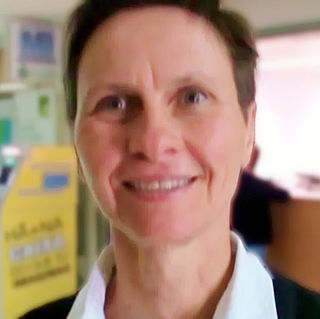
The University of Lisbon is a public research university in Lisbon, and the largest university in Portugal. It was founded in 2013, from the merger of two previous public universities located in Lisbon, the former University of Lisbon (1911–2013) and the Technical University of Lisbon (1930–2013). The history of a university in Lisbon dates back to the 13th century.

António Lobo Antunes, GCSE is a Portuguese novelist and retired medical doctor. He has been named as a contender for the Nobel Prize in Literature. He has been awarded the 2000 Austrian State Prize, the 2003 Ovid Prize, the 2005 Jerusalem Prize, the 2007 Camões Prize, and the 2008 Juan Rulfo Prize.

Instituto Superior TécnicoMHSE • MHIP is a public school of engineering and technology, part of University of Lisbon. It was founded as an autonomous school in 1911, and integrated in the Universidade Técnica de Lisboa in 1930. IST is the largest school of engineering in Portugal by number of enrolled students, faculty size, scientific production and patents.

Nelas is a municipality located in the Centro Region of continental Portugal. The population in 2011 was 14,037, in an area of 125.71 km².
The Pessoa Prize, named after Fernando Pessoa, is recognized as the most important award in the area of Portuguese culture. Created in 1987 by the newspaper Expresso and the IT company Unisys, since 2008 the prize has been sponsored by Caixa Geral de Depósitos. It is granted annually to the Portuguese person who during this period, and in the course of previous activity, has distinguished him or herself as a figure in scientific, artistic, or literary life.

Science and technology in Portugal is mainly conducted within a network of research and development (R&D) units belonging to public universities and state-managed autonomous research institutions. There are also non-state-run research institutions and some private R&D projects developed by companies.

João Lobo Antunes was a Portuguese neurosurgeon.

ISCTE – Instituto Universitário de Lisboa is a Portuguese public tertiary education institution. It is located in the city centre of Lisbon, in Cidade Universitária, adjoining the Institute of Social Sciences (ICS) and Institute of Geography and Spatial Planning (IGOT) of the University of Lisbon. ISCTE was formerly called Instituto Superior de Ciências do Trabalho e da Empresa, but its full name was dropped in 2009 when it became a university institute of foundational nature. As of today, ISCTE is widely considered a fully-fledged public research university despite its traditional designation, as reflected in national news coverage of the performance of Portuguese universities internationally and open, external assessments by international organisations. ISCTE Business School holds institutional accreditations from the Association to Advance Collegiate Schools of Business (AACSB) and Association of MBAs (AMBA).

The Secondary School Luís de Camões is a secondary school located in the civil parish of Arroios, in the municipality and Portuguese capital of Lisbon, classified as a Monumento de Interesse Público in 2012.

The University of Lisbon was a public university in Lisbon, Portugal. It was founded in 1911 after the fall of the Portuguese monarchy and was later integrated in the new University of Lisbon along with the former Technical University of Lisbon. The history of a university in Lisbon dates back to the 13th century.
The Instituto de Estudos Medievais is a centre for advanced research on medieval studies attached to the Faculty of Social and Human Sciences (FCSH) of Universidade Nova de Lisboa, in Portugal. Founded in 2002 by Portuguese medieval historians Luis Krus and José Mattoso, the IEM is one of the largest centres of its kind in the Portuguese and Spanish-speaking world and the largest in Portugal.

The Faculty of Pharmacy, Universidade de Lisboa (FFUL) is a Portuguese public institution of higher education dedicated to education, research, knowledge transfer and continuing education in the fields of pharmacy, medicine, and pharmaceutical sciences.

João de Sande Magalhães Mexia Ayres de Campos, 2nd Count of Ameal, ComC, CvNSC was a Portuguese politician and career diplomat, having served in this capacity in the Hague, and also as Secretary to Portugal's Minister of Foreign Affairs, Venceslau de Lima. He was as a key participant in the failed republican Municipal Library Elevator Coup of 1908, which targeted the Constitutional monarchy of King Charles I and what were perceived as the dictatorial powers of his then prime minister João Franco.
Maria Manuel Mota is a Portuguese malariologist and executive director of the Instituto de Medicina Molecular, Lisbon.

Fausto J. Pinto is a Portuguese academic. He is Professor of Cardiology at Hospital de Santa Maria. Dean of the Faculty of Medicine at the University of Lisbon.
Maria de Lourdes Belchior Pontes• Großes Verdienstkreuz • GCRB • Officier • GCIH • ComSE • GCIP •, was a Portuguese writer, poet, professor and diplomat who lived in Portugal, Brazil, France, Germany and the United States of America.
Carlos Carneiro Antunes was a Portuguese politician and anti-fascist militant. He was, together with Isabel do Carmo, co-founder of the Brigadas Revolucionárias, one of the faces of the opposition to the Estado Novo.
Isabel do CarmoComL is a Portuguese doctor, writer and former university professor. She was part of an armed struggle against the Portuguese government, both before and after the overthrow of the repressive Estado Novo regime, and was held in prison from 1978 to 1982. Carmo has published extensively, on both medical and political issues.

Maria do Carmo Fonseca is a Portuguese scientist, full professor of Molecular Cell Biology and Onco-biology at the University of Lisbon Medical School and president of the Instituto de Medicina Molecular João Lobo Antunes.













